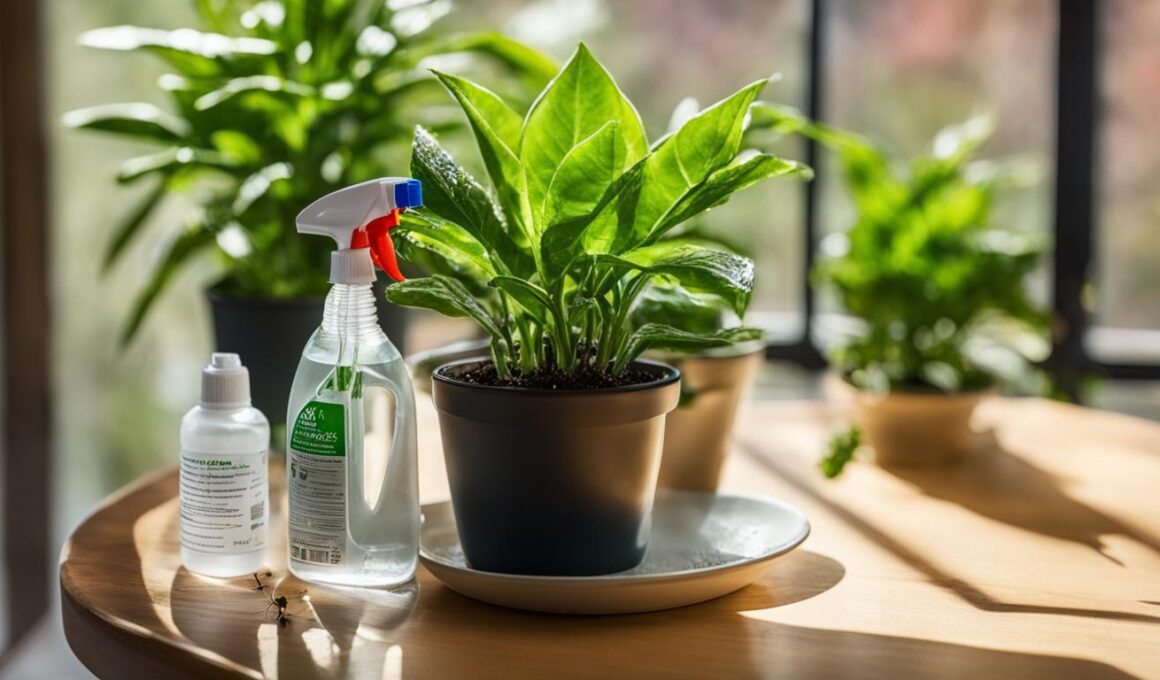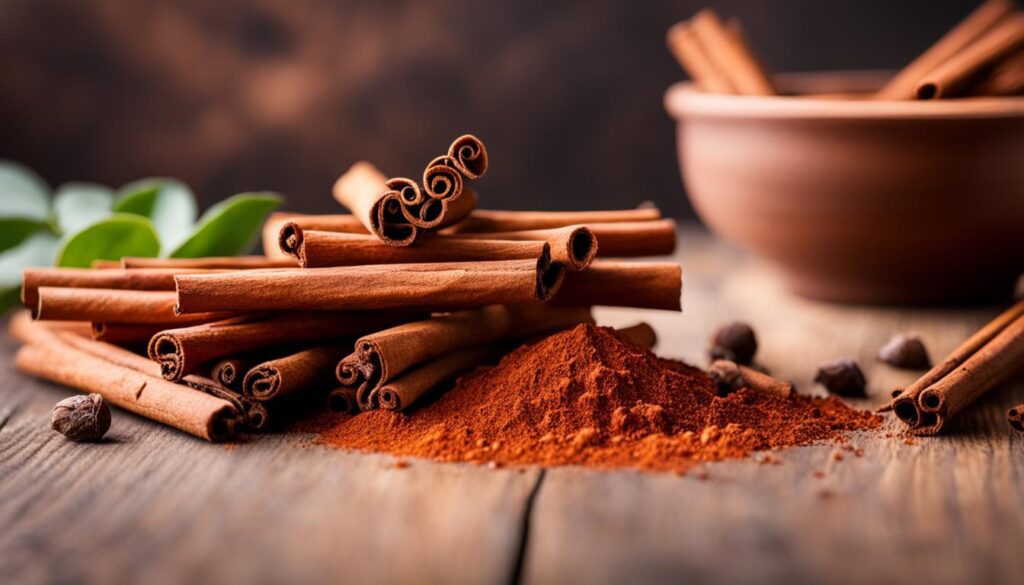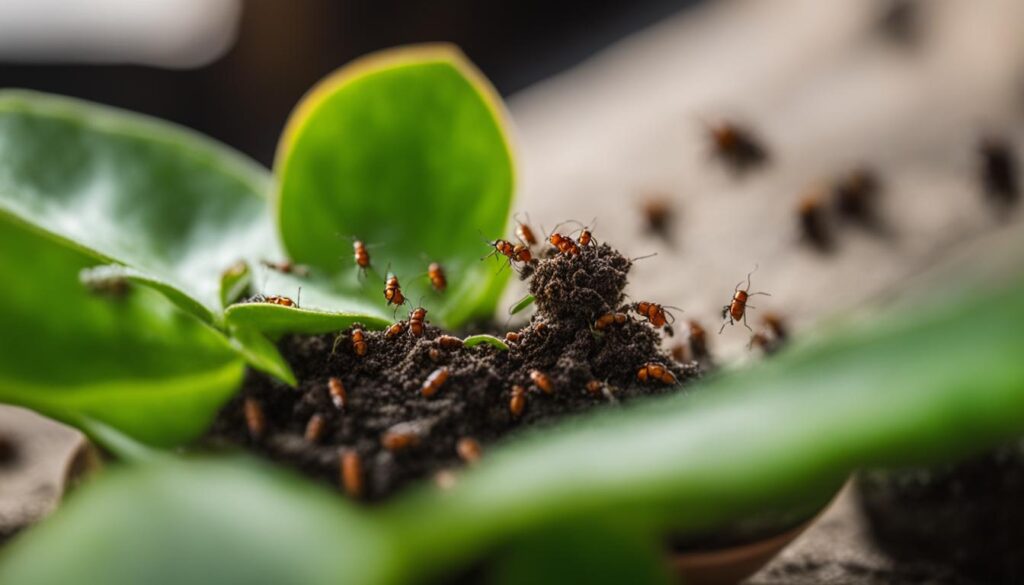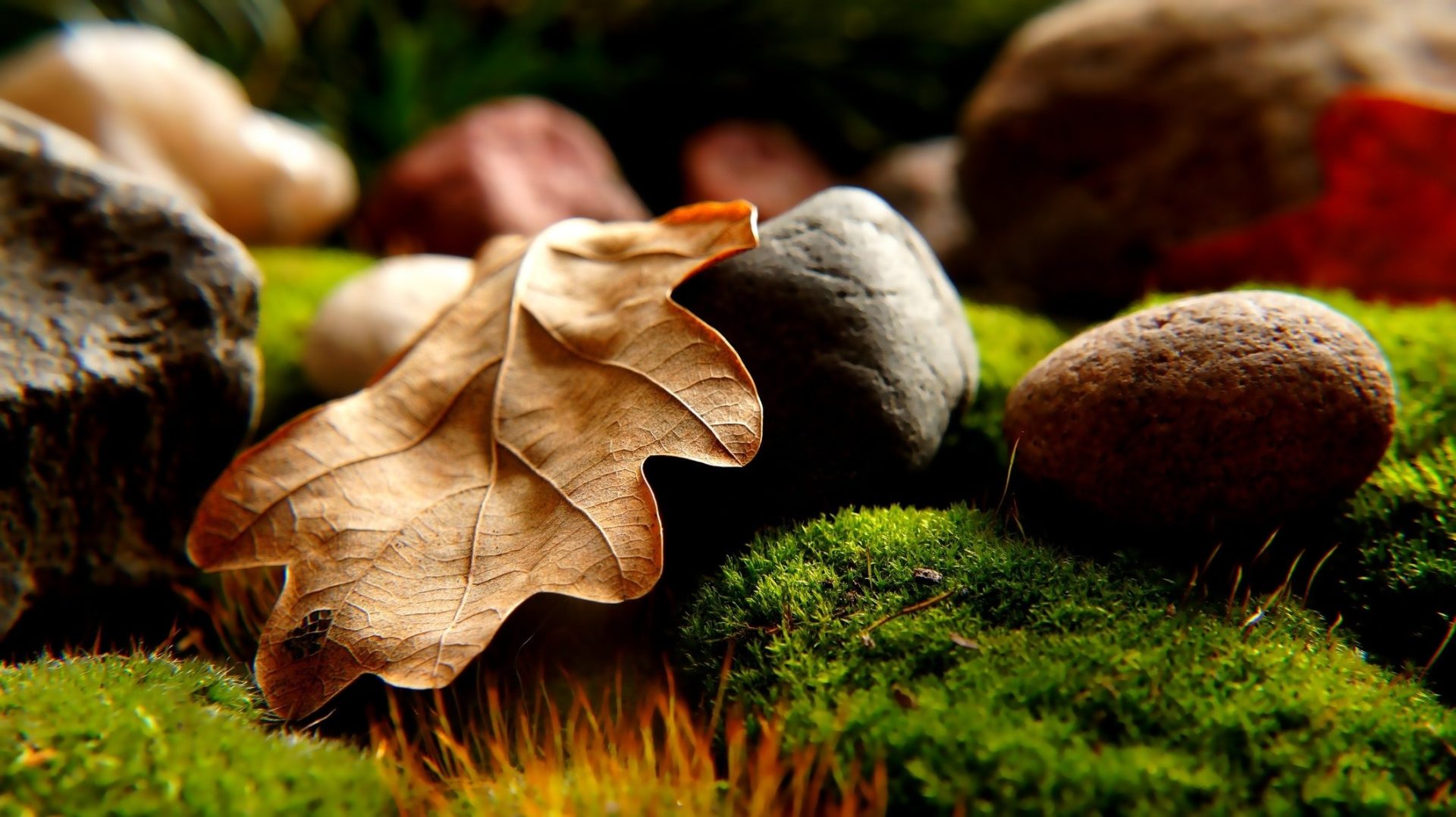Indoor plants bring beauty and fresh air into your home, but they can also attract unwanted guests – pests and bugs. Don’t worry, though, because there are safe and effective solutions to keep these intruders at bay. You don’t have to resort to harsh chemicals that may harm your beloved plants or pose a risk to your health. With a few household ingredients, you can create homemade insecticides that are both effective and non-toxic. Here, we’ll explore some options for what to spray on your indoor plants to get rid of bugs, based on research and expert advice.
Key Takeaways:
- Spray on indoor plants for bugs using homemade insecticides
- Safe and effective solutions to get rid of pests
- Protect your plants without harming them or risking your health
- Easy-to-find household ingredients for homemade insecticides
- Expert-recommended methods for eliminating indoor plant pests
Dishwashing Liquid or Castille Soap
Dishwashing liquid or Castille soap can be an effective homemade pesticide for controlling pests on your indoor plants. These common household ingredients can help you get rid of leaf-sucking pests like spider mites, mealybugs, and aphids.
The soapy residue left by dishwashing liquid or Castille soap suffocates the pests and makes the foliage unappetizing to them, keeping them away from your plants. To create a simple soap spray, mix 1 teaspoon of dishwashing liquid or Castille soap with 1 liter of water in a spray bottle. Make sure to cover both the top and bottom of the leaves when applying the solution. Repeat the spray every 4 to 7 days to effectively control the pests.
Using dishwashing liquid or Castille soap as an insecticide is a safe and non-toxic way to protect your indoor plants from pests. Remember to test the solution on a small area of your plant before applying it to the entire plant, as some plants may be sensitive to the soap spray.
Cinnamon for Natural Pest Deterrent
When it comes to protecting your indoor plants from pests, cinnamon is a natural solution that can work wonders. Not only does it add flavor to your baked goods, but it also has properties that can help prevent fungal growth and deter insects. By using cinnamon as a natural pest deterrent, you can keep your houseplants healthy and free from unwanted guests.
One of the main benefits of using cinnamon is its ability to deter fungus gnats, which can be a common problem for indoor plants. These tiny insects thrive in moist potting soil and can cause damage to the roots of your plants. However, the antibacterial and antifungal properties of cinnamon can help prevent the growth of fungi in the soil, making it less appealing for fungus gnats.
To use cinnamon as a natural pest deterrent, simply sprinkle a fine layer of ground cinnamon on the top layer of soil after watering your plants. This will help dry out the soil and discourage fungus gnats from laying eggs. Additionally, the scent of cinnamon can also act as a deterrent for other insects, keeping them away from your precious plants.
Benefits of Using Cinnamon:
- Prevents fungal growth in potting soil
- Deters fungus gnats from infesting your plants
- Serves as a natural, non-toxic pest deterrent
- Safe to use and does not harm your plants
By incorporating cinnamon into your indoor plant care routine, you can create an environment that is less attractive to pests. Its natural properties make it a safe and effective alternative to chemical pesticides. So go ahead, reach for the cinnamon shaker, and give your plants the protection they deserve.
Using Vegetable Oil as Effective Pest Control for Aphids and Mites
When it comes to controlling pests like aphids and mites on your indoor plants, vegetable oil can be a highly effective solution. The effects of oils on insects can help suffocate these pests and disrupt their metabolism, ultimately leading to their demise.
To create a vegetable oil pesticide, you’ll need 2 tablespoons of dishwashing liquid, 1/2 cup of vegetable oil, and water. Mix these ingredients in a jar, then dilute 2 tablespoons of the mixture with 1 liter of water in a spray bottle. Apply the diluted solution to the infected plants, making sure to cover both the upper and lower surfaces of the leaves.
The vegetable oil works by blocking the insects’ air holes, preventing them from breathing and causing their metabolism to malfunction. This method is particularly effective against sap-sucking pests like aphids, scale, thrips, mealybugs, and spider mites. Regularly spraying the solution every 4 to 7 days will help eliminate these pests and protect your indoor plants.
Benefits of Using Vegetable Oil as Pest Control:
- Non-toxic: Unlike chemical pesticides, vegetable oil is a safe and environmentally-friendly option for pest control.
- Effective against multiple pests: Vegetable oil can help control a range of common indoor plant pests, including aphids, mites, scale, mealybugs, and thrips.
- Easy to make: With just a few household ingredients, you can create your own vegetable oil pesticide to combat pests.
- Sustainable choice: Opting for natural pest control methods like vegetable oil reduces reliance on harmful chemicals and promotes a healthier ecosystem.
By using vegetable oil as a pest control method, you can effectively combat aphids and mites on your indoor plants while keeping your home and environment safe. Remember to always spot-test any spray or treatment on a small area of your plant before applying it to the entire plant to ensure compatibility.
Diatomaceous Earth: A Safe and Effective Solution for Controlling Soft-Bodied Pests
When it comes to dealing with soft-bodied pests like aphids and mealybugs on your indoor plants, diatomaceous earth is an excellent natural solution. Made from fossilized algae and microscopic creatures, diatomaceous earth is a powdery substance that can effectively control these pests without the use of harsh chemicals.
The unique structure of diatomaceous earth consists of sharp fragments that pierce the exoskeleton of pests, causing them to dry out and perish. This natural drying effect makes diatomaceous earth an ideal choice for controlling infestations of aphids, mealybugs, fungus gnats, ants, thrips, and spider mites.
To use diatomaceous earth, simply sprinkle a thin layer over the potting soil of your plants and gently rub it onto the leaves. Be sure to cover all affected areas, paying close attention to the undersides of leaves where pests tend to hide. Repeat the application every few days or as needed until the infestation is under control.
“Diatomaceous earth is a game-changer when it comes to controlling soft-bodied pests. Its natural drying properties effectively eliminate pests without harming your plants or the environment.” – Gardening Expert
While diatomaceous earth is an incredibly safe and non-toxic pest control method, it’s important to exercise caution when handling it. The sharp fragments can irritate the eyes and respiratory system if inhaled, so it’s advisable to wear goggles and a mask while applying it. Additionally, keep in mind that diatomaceous earth loses its effectiveness when wet, so reapply after rainfall or watering.
Benefits of Using Diatomaceous Earth:
- Effective against a wide range of soft-bodied pests
- Non-toxic and safe for use around children and pets
- No harmful chemical residues on your plants
- Long-lasting protection against future infestations
- Environmentally-friendly alternative to chemical pesticides
With diatomaceous earth, you can take control of soft-bodied pests in a safe and effective way. Its natural properties provide long-lasting protection for your indoor plants, ensuring a healthy and thriving green space.
Conclusion
When it comes to dealing with pests on your indoor plants, there are several effective and non-toxic solutions you can try. By using common household ingredients, you can keep your houseplants healthy and pest-free.
One option is to use dishwashing liquid or Castille soap as a pesticide. This method works well against leaf-sucking pests like spider mites, mealybugs, and aphids. Simply mix 1 teaspoon of dishwashing liquid or Castille soap with 1 liter of water and spray the solution on your plants. Repeat every 4 to 7 days for optimal results.
Cinnamon is another natural deterrent for pests, particularly fungus gnats. Its antifungal properties prevent fungal growth in the soil and make it less attractive to these pests. After watering your plants, sprinkle ground cinnamon on the top layer of soil to keep fungus gnats at bay.
Vegetable oil can be used to control sap-sucking pests such as aphids, scale, thrips, mealybugs, and spider mites. By creating a vegetable oil pesticide using 2 tablespoons of dishwashing liquid, 1/2 cup of vegetable oil, and water, you can effectively suffocate and kill these insects. Dilute the mixture and apply it to your infected plants for best results.
Lastly, diatomaceous earth is a natural compound that can be used to control soft-bodied pests like aphids, mealybugs, and spider mites. Sprinkle diatomaceous earth over your potting soil and on the leaves of your plants to dry out and eliminate these pests.
Remember to test any spray or treatment on a small area of your plant first, and always maintain a healthy environment for your houseplants. By implementing these safe and non-toxic methods, you can maintain healthy indoor plants and enjoy a thriving green space.
What Are the Best Indoor Plant Bug Sprays for Eliminating Pests?
Looking for the best house plant bug spray to combat pesky pests? Look for products that are specifically formulated for indoor plants and are safe to use around pets and children. Consider natural options like neem oil or insecticidal soap to effectively eliminate bugs without harming your beloved plants.
FAQ
Can I use dishwashing liquid or Castille soap to get rid of pests on my indoor plants?
Yes, dishwashing liquid or Castille soap can be used to combat leaf-sucking pests such as spider mites, mealybugs, and aphids. The soapy residue suffocates the pests and makes the foliage unappetizing to them.
How do I use cinnamon to deter fungus gnats on my houseplants?
Sprinkle a fine layer of ground cinnamon on the top layer of soil after watering to dry it out and discourage fungus gnats. Cinnamon has antibacterial and antifungal properties, preventing fungal growth in the soil and making it less appealing for fungus gnats.
Can vegetable oils be used as a pest control method for indoor plants?
Yes, vegetable oils such as canola oil and soybean oil can be used to control sap-sucking pests like aphids, scale, thrips, mealybugs, and spider mites. Oils can suffocate insects by blocking their air holes and disrupt their metabolism, ultimately killing them.
What is diatomaceous earth and how does it help with pest control on indoor plants?
Diatomaceous earth is a natural compound made from fossilized algae and microscopic creatures. It is effective against soft-bodied pests like aphids, mealybugs, fungus gnats, ants, thrips, and spider mites. The sharp fragments of diatomaceous earth pierce the exoskeleton of these pests, drawing out their moisture and drying them out.
Are these homemade insecticides safe to use?
Yes, these homemade insecticides are non-toxic and safe to use. However, it is important to test any spray or treatment on a small area of your plant before applying it to the entire plant. Additionally, take precautions when using diatomaceous earth, as it can become airborne and cause irritation.
How can I prevent pest infestations on my indoor plants?
Maintaining a healthy environment for your plants, such as proper watering and minimizing stress, can help prevent pest infestations. Regularly inspect your plants for signs of pests and take action promptly if you notice any infestations.












